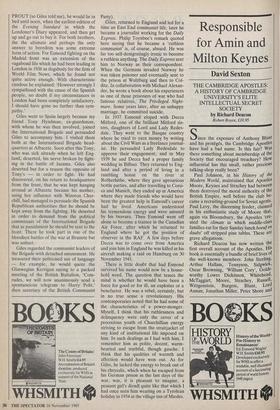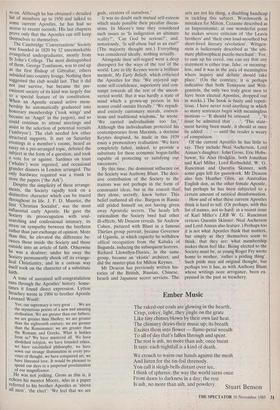Responsible for Amin and Milton Keynes
David Sexton
THE CAMBRIDGE APOSTLES: A HISTORY OF CAMBRIDGE UNIVERSITY'S ELITE INTELLECTUAL SECRET SOCIETY by Richard Deacon
Robert Royce, £10.95
Since the exposure of Anthony Blunt and his proteges, the Cambridge Apostles have had a bad name. Is this fair? Was there something about membership of the Society that encouraged treachery? How influential has this small, rather precious talking-shop really been? Paul Johnson, in his History of the Modern World, maintained that Apostles Moore, Keynes and Strachey had between them destroyed the moral authority of the British Empire, well before the club be- came a recruiting-ground for Soviet agents. Paul Levy, the discerning feeder, claimed in his enthusiastic study of Moore that, again via Bloomsbury, the Apostles 'cre- ated the climate in which middle-class families eat for their Sunday lunch boeuf en daubs' off stripped pine tables. These are grave allegations. Richard Deacon has now written the first overall account of the Apostles. His book is essentially a bundle of brief lives of the well-known members: John Sterling, Arthur Hallam, Tennyson, Sidgwick, Oscar Browning, 'William Cory', Golds- worthy Lowes Dickinson, Whitehead, McTaggart, Moore, Strachey, Russell, Wittgenstein, Burgess, Blunt, Lord Annan, Jonathan Miller, Peter Shore and so on. Although he has obtained i detailed list of members up to 1950 and talked to some current Apostles, he has had no access to recent records. His last chapters Prove only that the Apostles can still keep themselves to themselves.
The Cambridge 'Conversazione' Society was founded in 1820 by 12 unremarkable evangelical undergraduates, mostly from St John's College. The most distinguished of them, George Tomlinson, was to end up as the first Bishop of Gibraltar; others subsided into country livings. Nothing then suggested the club would last. That it did not just survive, but became the pre- eminent society of its kind was largely due to a special feature of its constitution. When an Apostle ceased active mem- bership he automatically graduated into honorary membership (look wings' and became an 'Angel' in the jargon), and so could continue to attend meetings and assist in the selection of potential recruits (`embryos'). The club needed few other structural supports. It met on Saturday evenings in a member's rooms, heard an essay on a pre-arranged topic, debated the subject in the form of a question, and took a vote for or against. Sardines on toast (`whales') were ingested, and occasional grander dinners in London arranged. The only hardware required was a trunk to store the papers (`-the Ark'). Despite the simplicity of these arrange- ments, the Society rapidly took on a distinctive character which can be traced throughout its life. J. F. D. Maurice, the first 'Christian Socialist', was the most Influential early Apostle. He gave the Society its preoccupation with soul- searching and confessional intimacy, its stress on sympathy between the brethren rather than just exchange of opinion. More than this, he elevated the difference be- tween those inside the Society and those outside into an article of faith. Otherwise he was a doubter; under his sway the Society permanently shook off its evange- lical Christianity, and in a curious way itself took on the character of a substitute faith.
A tone of sustained self-congratulation runs through the Apostles' history. Some- times it found direct expression. Lytton Strachey wrote in 1904 to brother Apostle Leonard Woolf:
Yes; our supremacy is very great . . We are the mysterious priests of a new and amazing civilisation. We are greater than our fathers; we are greater than Shelley; we are greater than the eighteenth century; we are greater than the Renaissance; we are greater than the Romans and Greeks. What is hidden from us? We have mastered all. We have abolished religion, we have founded ethics, we have established philosophy, we have sown our strange illumination in every pro- vince of thought, we have conquered art, we have liberated love. It would be pleasant to spend our days in a perpetual proclamation of our magnificence.
He was not joshing. Gross as this is, it echoes his mentor Moore, vtho in a paper referred to his brother Apostles as 'above all men', 'the elect': 'We feel that we are gods, creators of ourselves.'
It was no doubt such mutual self-esteem which made possible their peculiar discus- sions. In Moore's time they considered such issues as 'Is indigestion an ultimate reality?', 'Can God be serious?', and, notoriously, 'Is self-abuse bad as an end?' (The majority thought not.) Everything was considered ideally, nothing actually.
Alongside their self-regard went a, deep disrespect for the ways of the rest of the world. Late in life Keynes wrote u brilliant ' memoir, My Early Beliefs, which criticised the Apostles for this: 'We enjoyed sup- reme self-confidence, superiority and con- tempt towards all the rest of the uncon- verted world. But it was hardly a state of mind which a grown-up person in his senses could sustain literally.' We repudi- ated entirely customary morals, conven- tions and traditional wisdoms,' he wrote: `We carried individualism too far.' Although this individualism protected his contemporaries from Marxism, a doctrine Keynes despised, he made in this 1939 essay a premonitory realisation: 'We have completely failed, indeed, to provide a substitute for these economic bogus-faiths capable of protecting or satisfying our successors.'
By this time, the dominant influence on the Society was Anthony Blunt. The deci-". sive contribution of the Society to the traitors was not perhaps in the form of communist ideas, but in the conceit that they alone, secretly, knew better. This belief outlasted all else. Burgess in Russia still prided himself on, not having, given away Apostolic secrets. The heady left rationalism the Society bred had other ill-effects, Mr Deacon reveals. Sir Andrew Cohen, pictured with Blunt in a famous' Thirties group portrait, became Governor of Uganda, in which capacity he withdrew offical recognition from the Kabaka of Buganda, inducing the subsequent horrors. Richard Llewellyn-Davies, in the same group, became an 'ekistic' architect, and did the master-plan for Milton Keynes. ' Mr Deacon has previously written his- tories of the British, Russian, Chinese, Israeli and Japanese secret services. The arts are not his thing, a disabling handicap in tackling this subject. Wordsworth is mistaken for Milton, Cezanne described as an Impressionist; at one wonderful point he makes severe criticism of 'the Leavis brothers' and 'their own loud-mouthed but short-lived literary revolution'. Wittgen- stein is ludicrously described as 'the ulti- mate philosophical puzzle-merchant': 'For, to sum up his creed, one .can say that any statement is either true, false, or meaning- less, and it was in the area of meaningless where inquiry and debate should take place.' (On the contrary, it is perhaps indicative that both Tennyson and Witt- genstein, the only two truly great men to have been elected Apostles, dropped out in weeks.) The book is fuzzy and repeti- tious. I have never read .anything in which so many sentences begin with meaningless motions — 'It should be stressed . 'It must be admitted that . . 'This state- ment having been made, it should at once be added . . — until the reader is weary of compulsion.
Of the current Apostles he has' little to say. They include Neal- Ascherson, Lord Annan's daughter, John Gross, Eric Hobs- bawm, Sir Alan Hodgkin, both Jonathan and Karl Miller, Lord ,Rothschild, W. G. Runciman and Quentin Skinner, with some gaps left for guesswork. Mr Deacon also lists Heather Glen, an Australian English don, as the other female Apostle, but perhaps he has been subjected to a certain amount of satirical disinformation.
How and of what these current Apostles think is hard to tell. (Or perhaps, with this list of names, not so hard: in a recent issue of Karl Miller's LRB W. G. Runciman reviews Quentin Skinner; Neal Ascherson and Lord Annan also feature.) Perhaps too it is not what Apostles think that matters, but simply as they themselves seem to think, that they are: what membership makes them feel like. Being elected to the Society must be, as young'Roger Fry wrote home to mother, 'rather a priding thing'. Such pride may aid original thought, but perhaps too it has, as with Anthony Blunt whose writings ooze arrogance, been ex- pressed in the past as treachery.



































































 Previous page
Previous page